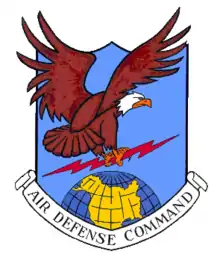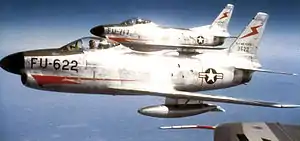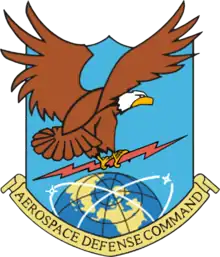520th Air Defense Group
The 520th Air Defense Group is a disbanded United States Air Force organization. Its last assignment was with the 4706th Air Defense Wing at Truax Field, Wisconsin, where it was inactivated in 1955. The group was originally activated as a support unit for the 340th Bombardment Group at the end of World War II in Italy and then redeployed to the United States where it was inactivated in 1945.
520th Air Defense Group
 | |
|---|---|
 F-86D Sabres of the 520th Air Defense Group's 432d FIS, November 1953 | |
| Active | 1944–1945, 1953–1955 |
| Country | |
| Branch | |
| Type | Fighter Interceptor |
| Role | Air Defense |
| Part of | Air Defense Command |
The group was activated once again in 1953, when ADC established it as the headquarters for a dispersed fighter-interceptor squadron and the medical, maintenance, and administrative squadrons supporting it. It was replaced in 1955 when ADC transferred its mission, equipment, and personnel to the 327th Fighter Group in a project that replaced air defense groups commanding fighter squadrons with fighter groups with distinguished records during World War II.
History
World War II
The group was first activated during World War II in Italy in late 1944 as the 520th Air Service Group[1] as part of a reorganization of Army Air Forces (AAF) support groups in which the AAF replaced Service Groups that included personnel from other branches of the Army and supported two combat groups with Air Service Groups including only Air Corps units. Designed to support a single combat group.[2] Its 946th Air Engineering Squadron provided maintenance that was beyond the capability of the combat group,[3] its 770th Air Materiel Squadron handled all supply matters,[4] and its Headquarters & Base Services Squadron provided other support.[2][4] The group supported the 340th Bombardment Group in Italy. The group returned to the US and was inactivated in late 1945. It was disbanded in 1948.[5]
Cold War
During the Cold War, the group was reconstituted, redesignated as the 520th Air Defense Group, and activated at Truax Field in 1953[6] with responsibility for air defense of the Great Lakes area. It was assigned the 432d Fighter-Interceptor Squadron (FIS) and 433d FIS, which were already stationed at Truax Field, as its operational components.[7] The 432d FIS was flying North American F-86 Sabres,[8] while the 433d FIS was flying Northrop F-89 Scorpions equipped with airborne intercept radar.[8] Both squadrons had been assigned directly to the 31st Air Division.[7] The group also replaced the 78th Air Base Squadron as the USAF host unit for Truax Field. It was assigned three squadrons to perform its support responsibilities.[9][10]

In March 1953, the 432d FIS converted to a later radar equipped and Mighty Mouse rocket armed model of the "Sabre".[8] In July 1954, the 433d FIS moved to Alaska and was reassigned.[7] The following month, the 456 FIS was activated to replace the 433d FIS.[11] The 456th FIS was also equipped with "Sabres".[12] The group was inactivated[6] and replaced by the 327th Fighter Group (Air Defense)[13] as part of Air Defense Command's Project Arrow, which was designed to bring back on the active list the fighter units which had compiled memorable records in the two world wars.[14] The group was disbanded once again in 1984.[15]
Lineage
- Constituted as 520th Air Service Group
- Activated on 27 December 1944[1]
- Inactivated ca. 7 November 1945
- Disbanded 8 October 1948
- Reconstituted and redesignated as 520th Air Defense Group on 21 January 1953
- Activated on 16 February 1953
- Inactivated on 18 August 1955
- Disbanded on 27 September 1984
Assignments
- Unknown, 27 December 1944 – 7 November 1945 (probably XII Air Force Service Command until c. July 1945, Third Air Force after August 1945)
- 4706th Defense Wing (later 4706th Air Defense Wing), 16 February 1953 – 18 August 1955[6]
Stations
- Cervioni, Italy, 27 December 1944 – 15 April 1945[1]
- Rimini, Italy, 15 April 1945 – 15 July 1945 (sic)[16]
- Naples, Italy, 15 July 1945 – July 1945[16]
- Camp Patrick Henry, VA, 18 July 1945 – August 1945[16]
- Seymour Johnson Field, NC August 1945 – 15 September 1945[16][17]
- Columbia Army Air Base, SC, 15 September 1945 – ca. 7 November 1945[16]
- Truax Field, WI, 16 February 1953 – 18 August 1955
Components
|
Operational Squadrons
|
Support Units
|
Aircraft
- North American F-86F Sabre, 1953
- North American F-86D Sabre, 1953–1955
- Northrop F-89C Scorpion, 1953–1954
- Lockheed F-94 Starfire, 1953[7]
Commanders
- Col. L. E. Brooks 17 Dec 1944–1945[1]
- Unknown, 16 Feb 1953 – 18 Aug 1955
See also
References
Notes
Explanatory notes
- This image shows a later model of the F-89 than the one the squadron flew while it was part of the 520th
Footnotes
- "Abstract, History 520 Air Service Group Dec 1944 – Jan 1945". Air Force History Index. Retrieved 7 January 2012.
- Coleman, p. 208
- "Abstract, History 946 Air Engineering Squadron Dec 1944 – Jan 1945". Air Force History Index. Retrieved 7 January 2012.
- "Abstract, History 770 Air Materiel Squadron Dec 1944 – Jan 1945". Air Force History Index. Retrieved 7 January 2012.
- Department of the Air Force Letter, 322 (AFOOR 887e), 8 October 1948, Subject: Disbandment of Certain Inactive Air Force Units
- Cornett & Johnson, p. 82
- Maurer, Combat Squadrons, pp. 534–535
- Cornett & Johnson, p.128
- Cornett & Johnson, p.147
- "Abstract, History 520 Infirmary Jan–Jul 1955". Air Force History Index. Retrieved 21 June 2012.
- Maurer, Combat Squadrons, p. 562
- Cornett & Johnson, p.129
- Maurer, Combat Units, p. 209
- Buss, Sturm, Volan, & McMullen, p.6
- Department of the Air Force/MPM Letter 575q, 27 September 1984, Subject: Disbandment of Units
- "Abstract, History 520 Air Service Group Jun–Sep 1945". Air Force History Index. Retrieved 7 January 2012.(there is an obvious error in the departure date from Italy recorded in the unit history, since it requires a crossing of the Atlantic in three days)
- See Mueller
- Bailey, Carl E. (3 April 2009). "Factsheet 433 Weapons Squadron (ACC)". Air Force Historical Research Agency. Archived from the original on 14 September 2011. Retrieved 3 March 2012.
Bibliography
![]() This article incorporates public domain material from the Air Force Historical Research Agency website http://www.afhra.af.mil/.
This article incorporates public domain material from the Air Force Historical Research Agency website http://www.afhra.af.mil/.
- Buss, Lydus H.(ed), Sturm, Thomas A., Volan, Denys, and McMullen, Richard F., History of Continental Air Defense Command and Air Defense Command July to December 1955, Directorate of Historical Services, Air Defense Command, Ent AFB, CO, (1956)
- Coleman, John M (1950). The Development of Tactical Services in the Army Air Forces. New York, NY: Columbia University Press.
- Cornett, Lloyd H; Johnson, Mildred W (1980). A Handbook of Aerospace Defense Organization, 1946–1980 (PDF). Peterson AFB, CO: Office of History, Aerospace Defense Center.
- Maurer, Maurer, ed. (1983) [1961]. Air Force Combat Units of World War II (PDF) (reprint ed.). Washington, DC: Office of Air Force History. ISBN 0-912799-02-1. LCCN 61060979.
- Maurer, Maurer, ed. (1982) [1969]. Combat Squadrons of the Air Force, World War II (PDF) (reprint ed.). Washington, DC: Office of Air Force History. ISBN 0-405-12194-6. LCCN 70605402. OCLC 72556.
- Mueller, Robert (1989). Air Force Bases, Vol. I, Active Air Force Bases Within the United States of America on 17 September 1982 (PDF). Washington, DC: Office of Air Force History. ISBN 0-912799-53-6.
Further reading
- Grant, C.L., (1961) The Development of Continental Air Defense to 1 September 1954, USAF Historical Study No. 126
- Leonard, Barry (2009). History of Strategic Air and Ballistic Missile Defense (PDF). Vol I. 1945–1955. Fort McNair, DC: Center for Military History. ISBN 978-1-4379-2131-1.
